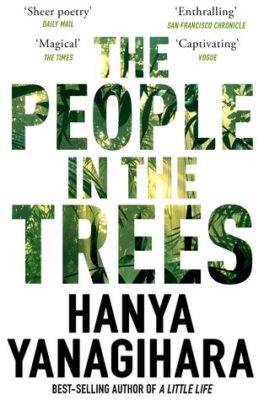Review: The People in the Trees by Hanya Yanagihara

This review is dedicated to George Pell.
‘The People in the Trees’ is about a doctor, Norton Perina, who joins an anthropology expedition to study the inhabitants of a remote island in the 1950s. He discovers people who are hundreds of years old. While their bodies remain healthy, their minds become deteriorated.
But this is not a fun, anthropological adventure. It’s a disturbing story of paedophilia and exploitation.
The book is structured as an autobiography written by Perina. The main plot points are all revealed within the first few pages. We learn that during his travels, Perina adopted over 40 children and took them to the USA. He was accused of sexually assaulting the children and convicted.
I found this book incredibly difficult to rate. It impressed me but I also kept wanting it to just end.
I have 1 positive to say about it and 2 negatives.
Positive #1: The writing is spectacular.
Yanagihara created a luscious and unsettling world on the island of Ivu’ivu. You’ll be eating fleshy fruits that throb with the movement of grubs inside, and smearing moist spam out of a can with your fingers. Equally vivid is the cold, disinfected world of Perina’s laboratory.
The protagonist is expertly characterised. We know how selfish and detached Perina is as he spins mice around by the tail before snapping their necks, and still the reader is nearly drawn towards feeling sympathy for him as he reveals his warped mindset towards little boys.
Negative #1: I didn’t like the angle the story was told from.
Perina is depicted as a villain, but in an oblique way, since the story is told from his own perspective.
I admired Yanagihara’s commitment to writing in such an authentic, believable style of an intellectual from the time period. But men like this already have so much power and spotlight in the real world, so I would have preferred to hear the voices of the exploited people and for Perina to be the definitive villain. (I guess the advantage of telling the story from Perina’s perspective means the book is filled with all that juicy moral ambiguity).
Negative #2: There’s no greater overall message.
I kept waiting for deeper points to be raised about cultural relativism and the ethics of anthropology. But I was just left thinking what is Yanagihara even trying to say? Is this just a shock value story about a paedophile?
I get it that the book is meant to be morally transgressive, and the life of Perina was the story Yanagihara wanted to tell. This just seems to perpetuate the problem of authors making vulnerable characters voiceless, à la ‘Heart of Darkness’. The people from the island rarely have names or personalities. They speak little, and are obedient as they are lead to the lab for scientific study. They are described by their black skin and furry pubic hair. Does this book in itself exploit vulnerable people in order to tell the story of a man who exploited vulnerable people?
In the real world…
The most disturbing aspect of the novel is that it is based on a real person, Daniel Carleton Gajdusek, and his interactions with the Simbari Anga people (sometimes called Kukukuku) who practiced ritualised homosexuality in Papua New Guinea. He really did adopt over 50 children, mostly boys, and was charged with child molestation.
In diary entries Gajdusek openly admitted to abusing children. He called little boys ‘seductive’ and skilled in massaging an orgasm. In an entry from 1962 he makes this note of Kukukuku boys: “shyness disappears immediately when they are alone and unobserved by a third party, replaced by prompt and overt genital handling and fellatio”.
Gajdusek served only 12 months in prison, and was warmly defended by supporters who considered that his scientific achievements outweighed his sex crimes.
In other unrelated news, Cardinal George Pell was released this week due to a legal technicality after spending only 12 months in prison for sex offences against choirboys.
I was caught off guard by ‘The People in the Trees’. The marketing focuses on the fantastical element of the story, which I felt mislead me from expecting a dark look into paedophilia. Unfortunately I was disappointed it wasn’t the adventure story I had been hoping for.
This is not a novel that you read to enjoy.
2 out of 5 wriggling edible grubs.
FYI: Contains sexual violence